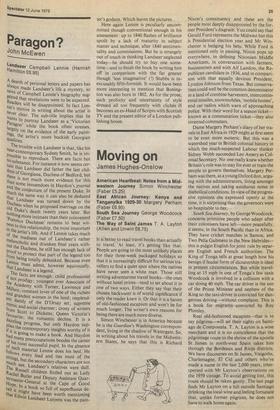Moving on
James Hughes-Onslow
American Heartbeat: Notes from a Midwestern Journey Simon Winchester (Faber £5.25)
East African Journey: Kenya and Tanganyika 1929-30 Margery Perham (Faber £6.95) South Sea Journey George Woodcock (Faber £7.50) The Way of Saint James T. A. Layton (Allen and Unwin £6.75)
It is better to read travel books than actually to travel. At least, it's getting like that. People are going to the most unlikely places for their three-week packaged holidays so that it is increasingly difficult for serious travellers to find a quiet spot where the natives have never seen a white man. Those still writing adventurous travel books—the ones without hotel prices—tend to set about it in one of two ways. Either they say that their chosen backwater is of world significance if only the reader knew it. Or that it is a haven of old-fashioned escapism and won't be for much longer. The writer's own reasons for being there are much more diverse.
Simon Winchester is in America because he is the Guardian's Washington correspondent, living in the shadow of Watergate. So, in writing about his travels in the Midwestern States, he says that this is Richard
Nixon's constituency and these are the people most deeply disappointed by the former President's disgrace. You could say that Gerald Ford represents the Midwest but this is Presidential election year and Mr Winchester is hedging his bets. While Ford is mentioned only in passing, Nixon pops up everywhere, in defining Nixonian Middle Americans, in conversation with farmers, businessmen and with Alf Landon, the Republican candidate in 1936, and in comparison with that equally devious President, Lyndon Johnson from Texas. But conservatism could well be the common denominator in a land of combine harvesters, intercontinental missiles, snowmobiles, 'mobile homes', and car radios which warn of approaching police. With their word for a season ticket— known as a commutation ticket—they also invented commuters.
Dame Margery Perham's diary of her travels in East Africa in 1929 might at first seem to be even more esoteric. But this was a watershed year in British colonial history in which the much-suspected Labour thinker Sidney Webb succeeded Leo Amery as Colonial Secretary. No one really knew whether Britain's role was to stay for ever or train the people to govern themselves. Margery Perham was there, as a young Oxford don, arguing with the administrators, living amongst the natives and taking assiduous notes in diabolical conditions. In view of the progressive opinions she expressed openly at the time, it is surprising that the governors were so hospitable to her.
South Sea Journey, by George Woodcock, concerns primitive people who adapt after their colonisers have left—more peacefully, it seems, in the South Pacific than in Africa. They have cricket matches in Samoa, and Two Pella Gubment in the New Hebrides— this is pidgin English for joint rule by separate English and French authorities. The King of Tonga tells at great length how his benign if feudal form of dictatorship is ideal in present circumstances. But while travelling at 15 mph in one of Tonga's few taxis Woodcock is involved in a collision with a car doing 40 mph. The car driver is the son of the Prime Minister and nephew of the King so the taxi-driver is convicted for dangerous driving—without complaint. This is a book for migrants convicted by Roy Plomley.
Real old-fashioned escapists—that is to say pilgrims—will set their sights on Santiago de Compostela. T. A. Layton is a wine merchant and it is no coincidence that the pilgrimage route to the shrine of the apostle St James in north-west Spain takes him through the Bordeaux and Rioja districts. We have discourses on St James, Visigoths, Charlemagne, El Cid and others who've made a name in the last 2,000 years, interspersed with Mr Layton's observations on the 1959 vintage. To avoid getting lost, this route should be taken gently. The last page finds Mr Layton on a hill outside Santiago drinking the local wine and feeling fortunate that, unlike former pilgrims, he does not have to walk home again.


































 Previous page
Previous page